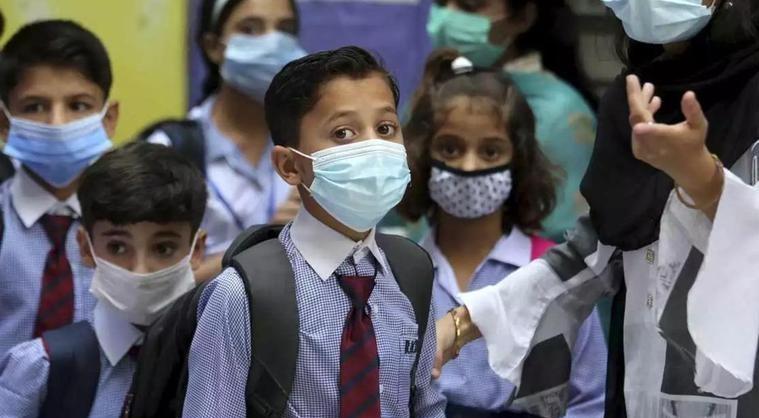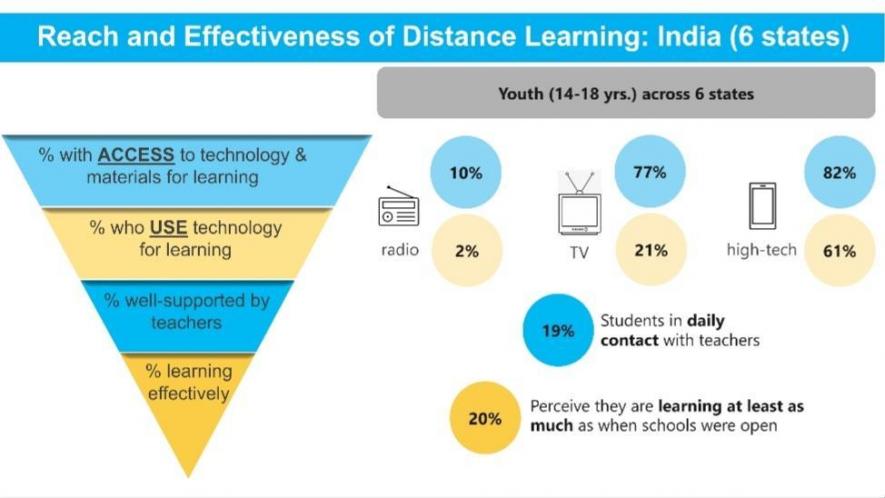80% of Indian Children Learnt Lesser During the Pandemic: UNICEF Report

Representational Image. Image Courtesy: PTI
At least 80% of children in India between the age of 14-18 years reported lower levels of learning during the Covid-19 pandemic than when physically at school, according to a recent UNICEF report.
The report pointed out that despite government, private and civil society actors coming together to roll out a wide range of remote learning resources, students are falling behind during the physical closure of schools since March 2020, due to the Covid-19 pandemic.
It said, "During the lockdown, students have been studying on average three to four hours a day. However, parents, students and teachers believe that learning and overall progress (including social and cultural skills, fitness, etc.) slowed down considerably. Only 60% of students have used any remote learning resources; and even among those, nearly 80% report that they are learning less or significantly less than in school."
"School closures in South Asia have forced hundreds of millions of children and their teachers to transition to remote learning in a region with low connectivity and device affordability. Even when a family has access to technology, children are not always able to access it. As a result, children have suffered enormous setbacks in their learning journey," George Laryea-Adjei, UNICEF Regional Director for South Asia, said.

In India, 42% of the children between 6-13 years of age reported not using any type of remote learning during school closures.
While students in private schools mostly used WhatsApp, private tuitions and live video classes, their government school peers mostly used textbooks, teacher home visits and YouTube for learning, so there were no major differences in overall usage levels, according to the report. "This means they have used any of the following for remote learning since the schools shut down: textbooks, worksheets, phone or video calls, WhatsApp to access materials or connect with teachers, learning programmes on radio or TV, YouTube videos, video classes, learning applications, home visits by teachers and private tuitions, community teaching at local locations, other websites," the report said.
It said that over half of the students who used remote learning did so across multiple resources. WhatsApp is the most used tool by students and teachers alike (over half of students and 89% of surveyed teachers). The report said, "Many parents, adolescents and teachers see value in technology tools, some even believe they are more effective than in-person learning. Of the teachers who found WhatsApp, YouTube and live video classes effective, approximately 40% thought they were more effective than in-person learning." However, it pointed out, the students who are perceived to be learning more are also more likely to have used high-tech tools.
More than 90% of students expect to return if schools re-open in the next three months, mainly to learn more and to better prepare for exams. But the report also observed that there is a serious risk of many students never returning to school due to pressures beyond just the immediate health risks- even after schools reopen. It said, "While health concerns are by far the largest deterrent to returning to school, a sizeable number of respondents cited financial constraints as well – 10% of families could not afford to send children back to school and 6% needed children to help earn an income."
The UNICEF called upon the governments to prioritise safe reopening of all schools while also ensuring that children are able to pursue quality learning remotely, if necessary.
“The safe reopening of schools must be considered an utmost priority for all governments. Parallelly, investing in teachers will ensure that teachers and schools can adapt to all situations. The more teachers are trained, equipped and supported on distance and blended learning, the better they will be able to reach all their students,” added George Laryea-Adjei. “This is a critical investment we need to make for children as the region gears up for future waves of Covid-19. We need to build systems which can weather any storm and keep children learning, no matter the circumstances," he said.
Assessment of learning levels and ensuring catching up by students, vaccination of teachers and support staff, expanding investments in education, working with the private sector and civil society organisations in improving connectivity and creating high-quality, preparing multilingual remote learning content tailored to students' needs, are among the recommendations made in the report.
Get the latest reports & analysis with people's perspective on Protests, movements & deep analytical videos, discussions of the current affairs in your Telegram app. Subscribe to NewsClick's Telegram channel & get Real-Time updates on stories, as they get published on our website.
























